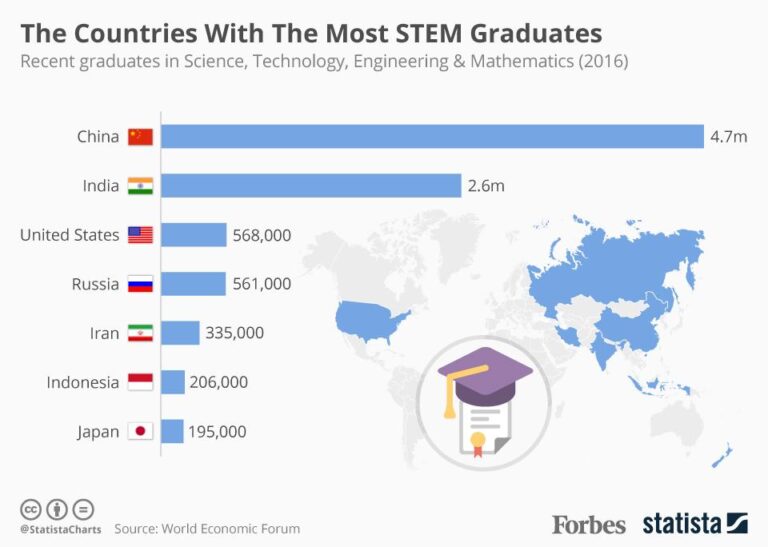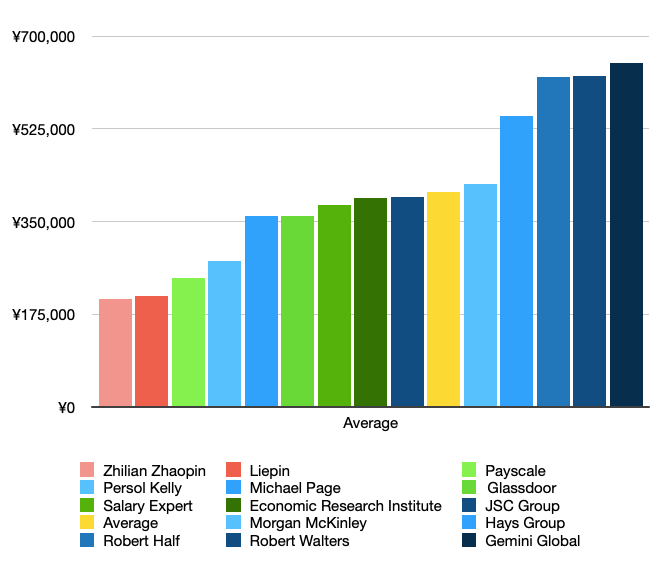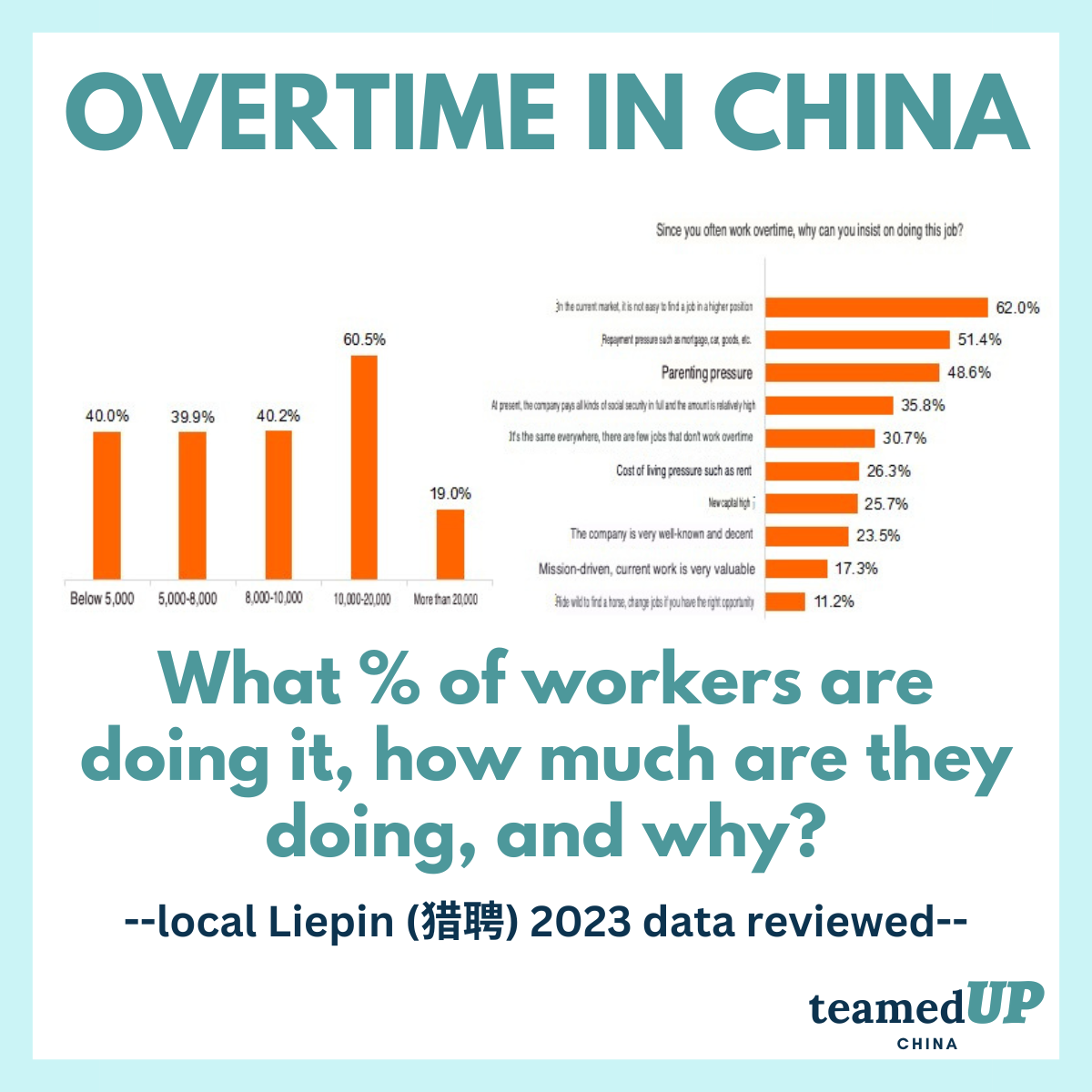A New Era of Jobs in China
Let’s start with some fun context. China is the world’s 2nd biggest economy and the world’s largest manufacturer and exporter by a longshot. It is also the world’s fastest-growing consumer market and second-largest importer of goods [China economy]. The country is a peer to only the United States in terms of global economic importance. China also has a HUGE and skilled workforce.
Having a great cohort of reliable staff in China is important for all types of businesses all over the world. Companies outsource jobs to China of all types. Here are 11 positions that can add the most impact when China-based in the modern era.
For each position, we’ll cover a general Job Description, the China-specific attributes that add value, as well as a TL;DR summary of the job category as it relates to China.
Having a great cohort of reliable staff in China is important for all types of businesses, all over the world.
Table of Contents:
High-Impact China-based Jobs
1) Sourcing Specialist / Sourcing Manager

Sourcing Specialist: Job Description
A sourcing specialist, often referred to as a procurement specialist or a sourcing manager, is a professional responsible for identifying and procuring goods, materials, or services for a company. They play a crucial role in the supply chain and procurement process, helping businesses obtain the necessary resources efficiently and cost-effectively.
Sourcing Specialist: China-Specific Attributes
- Local Supply Chain Support: A sourcing specialist in China can tap into China’s vast local logistics network to find suitable suppliers and negotiate favorable terms.
- Cost savings: China is often associated with competitive manufacturing costs, and the country’s supply chain technologies are only getting better at a brisk pace. A sourcing specialist can help identify cost-effective suppliers and negotiate prices to maximize cost savings.
- Local expertise: A sourcing specialist in China possesses local market knowledge, understanding of regulations, and cultural insights that can be invaluable when navigating the Chinese business environment. They can help ensure compliance with local laws and regulations and establish strong relationships with Chinese suppliers.
- Quality control: Ensuring product quality is crucial for businesses, and a sourcing specialist can help implement quality control measures and inspections at various stages of the supply chain to maintain product quality standards.
- Supplier relationship management: Establishing and maintaining good relationships with Chinese suppliers is essential for long-term success. A sourcing specialist can work on building and managing these relationships to ensure a reliable and efficient supply chain.
- Language and communication: A sourcing specialist in China can bridge the language and communication gap that may exist between a foreign company and Chinese suppliers. Effective communication is crucial for a successful partnership.
- Risk management: They can help identify and mitigate risks, such as supply chain disruptions, quality issues, or changes in local regulations that may affect the company’s operations in China.
- Streamlined logistics and shipping: Sourcing specialists often have experience in logistics and can assist with the efficient movement of goods from China to their final destination, including handling customs and import/export documentation.
China Sourcing Specialist: Summary
In summary, a sourcing specialist in China helps companies streamline their procurement processes, reduce costs, ensure quality, and navigate the complexities of the Chinese market. They are valuable assets for companies looking to source products or services from China and establish successful business relationships with Chinese suppliers.
2) Sourcing Quality Engineer (SQE)

Sourcing Quality Engineer (SQE): Job Description
A Sourcing Engineer, also known as a Sourcing Quality Engineer (SQE), is a professional who plays a critical role in the procurement and supply chain management process. They focus on ensuring the quality and reliability of products or components sourced from various suppliers, often with an emphasis on engineering and technical expertise.
Sourcing Quality Engineer (SQE): China-Specific Attributes
Here’s why a company might hire a Sourcing Engineer, particularly in China:
Quality assurance: Sourcing Engineers are responsible for evaluating and ensuring the quality of components or products sourced from suppliers. They conduct inspections, quality audits, and testing to make sure that the goods meet the required specifications and standards. This is particularly important in industries where product quality is a priority, such as automotive, electronics, and aerospace.
Technical expertise: Sourcing Engineers often have a strong background in engineering or a related technical field. Their technical knowledge allows them to understand the intricate details of products and materials, ensuring they meet the company’s technical requirements and specifications.
Supplier qualification: Sourcing Engineers assess and qualify potential suppliers based on their technical capabilities, production processes, and quality control systems. They help the company select suppliers with the necessary technical capabilities to meet its specific needs.
Process improvement: Sourcing Engineers work on process improvement with suppliers to optimize manufacturing and quality control processes. They may suggest changes to enhance product quality, reduce defects, and improve production efficiency.
Risk management: They identify and mitigate risks related to product quality and supply chain disruptions. By addressing potential issues early in the sourcing process, Sourcing Engineers help reduce the likelihood of defects and production delays.
Supplier relationship management: Building and maintaining strong relationships with suppliers is crucial. Sourcing Engineers work closely with suppliers to foster collaboration and understanding, ensuring that both parties are aligned on quality and technical requirements.
Communication and translation: They facilitate effective communication between the company and Chinese suppliers, bridging language and cultural differences. This is particularly important when discussing technical specifications and quality requirements.
Cost-effective sourcing: Sourcing Engineers may also focus on finding cost-effective solutions while maintaining product quality. They often negotiate pricing with suppliers to achieve the best balance between cost and quality.
Compliance with regulations: They ensure that products sourced from China comply with relevant industry standards and regulations, which can vary by sector and market.
China Sourcing Quality Engineer (SQE): Salary Coverage
We did a recent breakdown of over 85,000 local job data points covering SQE salary info. Included are the national average salary, regional average salaries, education requirements, and experience requirements for SQE jobs in China – Supplier Quality Engineers in China: Average Salary and Job Description.
China Sourcing Quality Engineer (SQE): Summary
In summary, Sourcing Engineers, or Sourcing Quality Engineers, play a pivotal role in assuring the quality, technical compliance, and reliability of products or components sourced from China. They leverage their technical expertise to evaluate suppliers, improve manufacturing processes, manage risks, and maintain strong supplier relationships. Their work is particularly critical for industries where product quality and precision are paramount.
3) Digital Marketer
For the (Very Unique) Chinese Market

Digital Marketer: Job Description
A Digital Marketer is a professional responsible for planning, implementing, and managing online marketing strategies and campaigns to promote a company’s products or services in the digital space. Their role involves utilizing various digital channels, such as websites, social media, email marketing, search engines, and online advertising, to reach and engage with target audiences. Digital Marketers often use data and analytics to measure the effectiveness of their campaigns and make data-driven decisions to optimize marketing efforts.
Digital Marketer: China-Specific Attributes
Let’s start out by saying that China has a (mostly) different internet. That includes search engines, e-commerce sites, social media apps, SaaS business tools, and even Networking and HR platforms. Now that we have that cleared up, the rest of this breakdown is really just riding that wave. You need a marketer in China on two fronts:
- Localize the marketing strategy and efforts to sync up with the language and culture. This applies to most countries or regions.
- Use country-specific or domestic-only websites, apps, and digital tools. This applies to China more so than perhaps any other place in the world.
Not convinced yet? Here are some more great reasons a company might hire a Digital Marketer in China:
Online presence and brand visibility: China has a vast and rapidly growing digital landscape, with a large population of internet users. To establish and maintain an online presence, companies need digital marketing professionals who can create and execute strategies to enhance brand visibility.
E-commerce growth: E-commerce is booming in China, with platforms like Alibaba’s Tmall and JD.com playing a significant role. Digital Marketers can help businesses navigate the e-commerce space, optimize product listings, and run online advertising campaigns to capture a share of this market.
Social media marketing: China has unique social media platforms, such as WeChat and Weibo, which are essential for connecting with consumers. Digital Marketers can create and manage content, engage with users, and run advertising campaigns on these platforms.
Search engine optimization (SEO): SEO is crucial for ensuring that a company’s website ranks well on Chinese search engines like Baidu. Digital Marketers can optimize website content and structure to improve search engine rankings.
Content marketing: Content marketing is an effective way to educate and engage consumers. Digital Marketers can develop content strategies, including articles, videos, and other media, to reach and inform the target audience.
Data-driven decision-making: Digital Marketers use data and analytics to measure the performance of marketing campaigns. They can identify what works and what doesn’t, enabling the company to allocate resources more effectively.
Localization and cultural understanding: A Digital Marketer in China is well-versed in the local culture and language, which is crucial for tailoring marketing campaigns to the Chinese market. Understanding cultural nuances and preferences is vital for success in the Chinese market.
Compliance and regulations: China has specific regulations related to online activities and advertising. A Digital Marketer in China can help ensure that the company’s digital marketing efforts comply with local laws and regulations.
China Digital Marketer: Summary
In summary, companies in China hire Digital Marketers to leverage the immense digital opportunities the market offers. These professionals help companies establish a strong online presence, reach their target audience, and adapt marketing strategies to the unique characteristics of the Chinese digital landscape.
4) Marketing Manager (China Market)

Marketing Manager: Job Description
A Marketing Manager is a more senior-level professional who plays a pivotal role in developing and executing marketing plans, managing marketing teams, and ensuring that marketing efforts align with the company’s goals and objectives. Marketing Managers are typically responsible for various aspects of marketing, including market research, product promotion, advertising, public relations, and brand management.
Marketing Manager: China-Specific Attributes
Please see above for a quick review of how China has its own internet. Marketing in China needs to be localized from the ground up.
In the context of China, a company might hire a Marketing Manager for several reasons:
Market Entry and Expansion: When a company seeks to enter the Chinese market or expand its existing presence, a Marketing Manager is essential to develop and execute market entry strategies. They can conduct market research, identify opportunities, and tailor marketing initiatives to the Chinese market.
Cultural Understanding: Marketing in China requires a deep understanding of Chinese culture and consumer behavior. A Marketing Manager with local knowledge can adapt marketing campaigns, messaging, and branding to resonate with Chinese consumers.
Digital Marketing: China has a unique digital landscape with its own social media platforms, search engines, and e-commerce ecosystems. Marketing Managers can navigate and leverage these platforms effectively to reach and engage Chinese consumers.
Regulatory Compliance: China has specific regulations and guidelines related to advertising, promotions, and marketing activities. A Marketing Manager can ensure that the company’s marketing efforts comply with local laws and regulations.
Brand Management: Building and maintaining a strong brand presence is crucial in China’s competitive market. Marketing Managers can develop brand strategies, oversee brand identity, and manage brand reputation.
Public Relations: Effective public relations are essential for managing a company’s image and relationships with stakeholders. Marketing Managers can handle media relations, crisis management, and PR campaigns in the Chinese market.
Product Localization: Marketing Managers play a role in localizing products and services for the Chinese market, which may involve adapting product features, packaging, and pricing to suit local preferences.
Competitive Analysis: Marketing Managers monitor and analyze the competitive landscape, identifying opportunities and threats. They can adjust marketing strategies based on competitors’ activities.
Sales Support: Marketing Managers collaborate with sales teams to provide them with the necessary marketing materials, leads, and support to drive sales and revenue.
Customer Insights: Marketing Managers collect and analyze customer data to gain insights into consumer preferences, behavior, and trends, which can inform marketing strategies and product development.
China Marketing Manager: Summary
In summary, companies in China hire Marketing Managers to lead and manage their marketing efforts in a market that is dynamic and culturally distinct. These professionals bring expertise in understanding Chinese consumers, navigating the unique digital landscape, and ensuring that marketing strategies are tailored to the local market’s characteristics and regulations.
5) Virtual Assistant / Professional Assistant
For China-Based Needs and Chinese Language Support

China Virtual Assistant (VA): Job Description
A Virtual Assistant (VA) is a remote professional who provides administrative, operational, or support services to individuals, businesses, or organizations. Virtual Assistants work from their own location and collaborate with their clients through digital communication tools. They handle a wide range of tasks, from administrative and clerical work to specialized tasks based on their expertise. The role of a Virtual Assistant has evolved with advancements in technology and can include services like email management, appointment scheduling, social media management, data entry, research, and more.
Virtual Assistant (VA): China-Specific Attributes
The right virtual assistance in China can cover a lot of territory. Bilingual Chinese staff with an understanding of the local environment are an invaluable asset for many firms across the globe.
In the context of China, a company might hire a Virtual Assistant for various reasons:
Cost-Effective Support: Virtual Assistants often offer cost-effective solutions for administrative and support tasks, as they can be hired on a flexible basis, saving the company money compared to hiring full-time employees.
Language and Communication Support: China is a diverse market with various languages and dialects. Companies may hire Virtual Assistants who are proficient in specific languages or dialects to communicate with customers, clients, or partners effectively.
Market Research: Virtual Assistants can assist in gathering data, conducting market research, and monitoring industry trends in the Chinese market, providing valuable insights for business strategies.
Administrative Tasks: Companies can outsource routine administrative tasks like email management, appointment scheduling, document preparation, and data entry to Virtual Assistants, freeing up valuable time for in-house staff to focus on core business activities.
Social Media Management: Virtual Assistants with social media expertise can manage a company’s presence on Chinese social media platforms, create and schedule content, engage with the audience, and monitor performance metrics.
Translation and Localization: Virtual Assistants with language skills can assist in translating documents, websites, and marketing materials, as well as localizing content to cater to the Chinese market’s preferences and cultural nuances.
Customer Support: Companies can hire Virtual Assistants to provide customer support services, including responding to inquiries, resolving issues, and managing online chat support in Chinese.
Project Assistance: Virtual Assistants can help with specific projects, such as event planning, market entry strategies, or research initiatives that require temporary or specialized support.
Data Analysis: Virtual Assistants with analytical skills can process and analyze data, which is valuable for business intelligence, reporting, and decision-making.
Time Zone Coverage: Companies operating in different time zones may hire Virtual Assistants to ensure that critical tasks can be handled during both local and international business hours.
Scalability: Virtual Assistants offer scalability, allowing companies to adjust their support services based on workload, business growth, or specific project needs.
China Virtual Assistant (VA): Summary
In summary, companies in China may hire Virtual Assistants to access a flexible and cost-effective workforce that can assist with various tasks, from administrative work to specialized functions. Virtual Assistants can help businesses manage their operations more efficiently, navigate language and cultural barriers, and access the skills and expertise needed to thrive in the Chinese market.
6) Software Engineer / Software Developer

Software Developer: Job Description
A Software Developer is a professional who designs, creates, tests, and maintains computer software and applications. They write code, develop software solutions, and work on programming tasks to meet specific business needs or solve technical problems. Software Developers can specialize in various programming languages and domains, such as web development, mobile app development, database management, or machine learning.
Software Developer: China-Specific Attributes

China graduates A LOT of Software Engineers and STEM-related professionals in general. Chinese education prioritizes STEM-related skills and the country as a whole is pro-tech and pro-modernization.
Make no mistake, the developer talent in China is advanced, relatively plentiful, and comparatively quite inexpensive.
In the context of China, a company might hire a Software Developer for several reasons:
Custom Software Development: Companies may require custom software applications tailored to their specific needs. Software Developers can create bespoke software to streamline operations, improve efficiency, and enhance productivity.
Web Development: In an increasingly digital world, having a strong online presence is essential. Software Developers are hired to build and maintain websites and web applications to engage with customers and clients.
Mobile App Development: With the proliferation of smartphones, mobile app development is a thriving sector. Software Developers create apps for various platforms to reach a mobile-savvy audience.
E-commerce Solutions: E-commerce is a growing market in China. Companies hire Software Developers to build and maintain e-commerce platforms, enabling online sales and customer transactions.
AI and Machine Learning: China is investing heavily in artificial intelligence (AI) and machine learning technologies. Software Developers with expertise in AI can help companies develop and deploy machine learning models and AI-driven solutions.
Big Data and Analytics: Companies often need to process and analyze large volumes of data. Software Developers can design software tools and systems for data collection, analysis, and reporting.
Localization and Language Support: To cater to the Chinese market, companies often require software that supports the Chinese language, including text input methods, character encoding, and language-specific features.
Software Maintenance and Updates: Companies hire Software Developers to maintain and update existing software to keep it secure, functional, and up to date with the latest technology.
Cybersecurity and Data Protection: With increasing cyber threats, companies need software solutions to protect their data and infrastructure. Software Developers can work on cybersecurity measures, including encryption, access controls, and threat detection.
Integration of Third-Party Services: Software Developers can integrate third-party services and APIs into a company’s software, enabling seamless functionality with external platforms and tools.
Regulatory Compliance: Companies operating in China must adhere to local regulations. Software Developers can ensure that software solutions meet compliance requirements, such as data privacy laws.
Innovation and Competitive Advantage: In a competitive market, companies hire Software Developers to innovate and gain a competitive edge by creating unique and advanced software solutions.
China Software Developer: Salary Information
We looked at 2022-2023 data from 14 leading sources, both local and international, to compare and find out what a reasonable salary range is for a software engineer in one of China’s first-tier cities.
Red Shades = Local HR Companies
Blue Shades = International HR Companies
Green Shades = Data Aggregators

Check out our full dive into this data on Software Developer Salaries in China.
China Software Developer: Summary
In summary, companies in China hire Software Developers to address a wide range of technical and business needs. These professionals play a crucial role in software development, enabling companies to stay competitive, meet regulatory requirements, and deliver technology solutions that cater to the Chinese market’s specific demands and preferences.
7) Key Account Executive

Account Executive: Job Description
An Account Executive is a professional responsible for managing and nurturing client relationships, particularly in sales and business development roles. Their primary objective is to maintain and grow a portfolio of accounts or clients by understanding their needs, providing solutions, and ensuring customer satisfaction. Account Executives often work in industries such as sales, advertising, public relations, or client services.
Account Executive: China-Specific Attributes
In the context of China, a company might hire an Account Executive for several reasons:
Client Acquisition: Account Executives play a crucial role in acquiring new clients and customers for a company. They identify and reach out to potential clients, pitch products or services, and close deals.
Client Relationship Management: Account Executives are responsible for building and maintaining strong relationships with existing clients. They act as a primary point of contact and provide ongoing support, ensuring that clients are satisfied with the company’s products or services.
Market Expansion: Companies often hire Account Executives to expand their market presence and increase market share in China. Account Executives help identify opportunities for growth and develop strategies to enter new markets or regions.
Cross-Selling and Upselling: Account Executives work to maximize revenue from existing clients by cross-selling additional products or services and upselling higher-tier solutions. This helps increase the company’s revenue per client.
Cultural and Language Understanding: Having local Account Executives in China who understand the culture, language, and business etiquette is crucial for building trust and rapport with Chinese clients. They can adapt communication and sales strategies to local preferences.
Client Support: Account Executives provide support and assistance to clients, addressing their inquiries, concerns, and needs promptly. They may work closely with customer support teams to ensure a seamless customer experience.
Market Insights: Account Executives gather insights into the Chinese market, including consumer preferences, industry trends, and competitive intelligence. This information is valuable for making informed business decisions.
Negotiation and Sales Skills: Account Executives are skilled negotiators who can close deals and agreements that benefit both the company and the client.
Regulatory Compliance: Companies operating in China must adhere to local regulations and standards. Account Executives ensure that sales and client relationships comply with legal and regulatory requirements.
Networking: Account Executives often have a strong network of contacts in the industry, which can be beneficial for building partnerships and identifying business opportunities.
Marketing and Brand Promotion: Account Executives may collaborate with marketing teams to promote the company’s brand and products to potential clients in the Chinese market.
China Account Executive: Summary
In summary, companies in China hire Account Executives to manage and grow client relationships, acquire new customers, and expand their market presence. Local Account Executives understand the nuances of the Chinese business landscape and can effectively tailor sales and client management strategies to cater to the specific needs and preferences of Chinese clients.
8) Customer Service Representative

Customer Service Rep: Job Description
A Customer Service Representative (CSR) is a front-line professional who serves as the primary point of contact between a company and its customers. The role of a CSR is to address customer inquiries, provide support, resolve issues, and ensure a positive customer experience. CSRs interact with customers through various communication channels, such as phone, email, live chat, or social media, and they play a critical role in maintaining customer satisfaction and loyalty.
Customer Service Rep: China-Specific Attributes
Have Chinese customers? Trust us – they’d really appreciate communicating issues with a Chinese person (in Chinese)…
In the context of China, a company might hire a Customer Service Representative for several reasons:
Local Language and Culture: CSRs in China are essential for providing customer support in the Chinese language and understanding the cultural nuances and preferences of Chinese customers. This is crucial for effective communication and building rapport.
Customer Support: CSRs handle a wide range of customer inquiries, including product information, order tracking, troubleshooting, and general assistance. They help customers with their questions and concerns promptly and professionally.
Order Processing: Companies often hire CSRs to assist with order processing, including order entry, payment processing, and logistics coordination to ensure smooth transactions.
Complaint Resolution: CSRs play a key role in resolving customer complaints and issues. They aim to provide solutions and address concerns to maintain customer satisfaction and loyalty.
Technical Support: In cases where a company offers technical products or services, CSRs may provide technical assistance to customers, guiding them through troubleshooting steps or coordinating with technical teams to resolve issues.
Market Insights: CSRs gather valuable insights about customer feedback, preferences, and pain points, which can be used to improve products and services, inform marketing strategies, and enhance the overall customer experience.
Regulatory Compliance: Companies operating in China must adhere to local regulations and standards. CSRs ensure that customer interactions and support processes comply with legal and regulatory requirements.
Cross-Selling and Upselling: CSRs may identify opportunities to cross-sell additional products or services to customers, which can increase revenue and improve the customer’s overall experience.
Social Media and Online Customer Service: With the growth of social media and e-commerce in China, CSRs often provide customer support through these channels, responding to inquiries and addressing issues in a digital environment.
Brand Reputation Management: CSRs contribute to brand reputation by delivering exceptional customer service and ensuring that customers have positive experiences, which can lead to word-of-mouth referrals and brand loyalty.
E-commerce Support: E-commerce companies hire CSRs to assist with tasks related to online shopping, including navigating websites, processing online orders, and resolving e-commerce-related issues.
China Customer Service Representative: Summary
In summary, companies in China hire Customer Service Representatives to provide professional and localized customer support, ensure customer satisfaction, and contribute to the success of their businesses in a highly competitive market. Local CSRs understand the specific needs and preferences of Chinese customers, making them valuable assets for delivering excellent customer service.
9) Sales Representative

Sales Representative: Job Description
A Sales Representative, also known as a Sales Associate or Salesperson, is a professional responsible for promoting and selling a company’s products or services to potential customers or clients. They play a vital role in the sales process, from identifying prospects and establishing initial contact to closing deals and maintaining relationships with existing clients. Sales Representatives are typically involved in activities such as lead generation, product demonstrations, negotiations, and achieving sales targets.
Sales Representative: China-Specific Attributes
The engine of any business – sales! With great local sales reps, firms can find and grow Chinese client accounts in a way that is not possible otherwise.
In the context of China, a company might hire a Sales Representative for several reasons:
Market Entry and Expansion: When a company is looking to enter the Chinese market or expand its existing presence, Sales Representatives are essential to develop and execute sales strategies tailored to the local market.
Client Acquisition: Sales Representatives identify and target potential clients, businesses, or customers, and work to acquire them as clients or customers. They use their knowledge of the Chinese market to identify sales opportunities.
Cultural Understanding: Sales Representatives in China understand the local culture, customs, and business etiquette, which is crucial for building trust and rapport with Chinese clients. They can adapt their sales approaches to local preferences.
Client Relationship Management: In addition to acquiring new clients, Sales Representatives maintain and nurture relationships with existing clients. They provide ongoing support, address inquiries, and ensure client satisfaction.
Cross-Selling and Upselling: Sales Representatives aim to maximize revenue from existing clients by cross-selling additional products or services and upselling higher-tier solutions. This helps increase the company’s revenue per client.
Market Insights: Sales Representatives gather valuable insights into the Chinese market, including consumer preferences, industry trends, and competitive intelligence. This information is valuable for making informed business decisions.
Language Skills: Sales Representatives in China often possess strong language skills, including proficiency in Mandarin and other local dialects, which is crucial for effective communication with clients.
Negotiation Skills: Sales Representatives are skilled negotiators who can close deals and agreements that benefit both the company and the client.
Regulatory Compliance: Companies operating in China must adhere to local regulations and standards. Sales Representatives ensure that sales processes comply with legal and regulatory requirements.
Networking: Sales Representatives often have a strong network of contacts in the industry, which can be beneficial for building partnerships and identifying business opportunities.
Marketing and Brand Promotion: Sales Representatives may collaborate with marketing teams to promote the company’s brand and products to potential clients in the Chinese market.
China Sales Representative: Summary
In summary, companies in China hire Sales Representatives to drive revenue growth, manage client relationships, and expand their market presence. Local Sales Representatives understand the nuances of the Chinese business landscape and can effectively tailor sales strategies to cater to the specific needs and preferences of Chinese clients, making them valuable assets for business development and sales efforts.
10) Business Development Manager (BDM)

Business Development Manager: Job Description
A Business Development Manager is a senior-level professional responsible for identifying growth opportunities, expanding a company’s market reach, and building strategic partnerships. They play a pivotal role in the growth and development of a business by identifying new business prospects, negotiating deals, and establishing relationships with key stakeholders. Business Development Managers typically work on a strategic level to drive the company’s revenue and profitability.
Business Development Manager: China-Specific Attributes
Have we mentioned that China is a bit different than some other countries? The countries uniqueness permeates throughout all business dealings and climates. Great China BD managers help their companies prepare adept and localized strategies for growth.
In the context of China, a company might hire a Business Development Manager for several reasons:
Market Expansion: Business Development Managers are crucial when a company seeks to enter the Chinese market or expand its existing presence. They develop and execute strategies for market entry and expansion.
Client Acquisition: They identify and acquire new clients, businesses, or customers in China. This includes understanding the local market and its dynamics to pinpoint sales opportunities.
Cultural Understanding: Business Development Managers in China understand the local culture, customs, and business etiquette. This knowledge is essential for building trust, rapport, and successful partnerships with Chinese clients and organizations.
Strategic Partnerships: They establish and nurture strategic partnerships with other businesses, suppliers, distributors, or organizations that can enhance the company’s growth and market reach in China.
Market Insights: Business Development Managers gather valuable insights into the Chinese market, including consumer preferences, industry trends, and competitive intelligence. This information is critical for making informed business decisions.
Legal and Regulatory Compliance: Companies operating in China must adhere to local regulations and standards. Business Development Managers ensure that business activities and partnerships comply with legal and regulatory requirements.
Networking: Business Development Managers often have a strong network of contacts in the industry and business community, which can be beneficial for building partnerships, identifying business opportunities, and navigating the Chinese business landscape.
Investment and Funding: In some cases, Business Development Managers may focus on securing investments, venture capital, or funding for the company’s growth initiatives in China.
Market Research and Analysis: They conduct thorough market research and competitive analysis to identify market gaps, trends, and potential areas for expansion or diversification.
Strategic Planning: Business Development Managers work on developing and executing strategic plans for growth, which may include market segmentation, product launches, and pricing strategies tailored to the Chinese market.
Marketing and Brand Promotion: They collaborate with marketing teams to promote the company’s brand and products to potential clients and partners in the Chinese market.
China Business Development Manager: Summary
In summary, companies in China hire Business Development Managers to drive business growth, expand market presence, and build strategic relationships. Local Business Development Managers understand the intricacies of the Chinese business environment, making them invaluable for identifying opportunities and navigating the specific needs and preferences of the Chinese market. Their strategic efforts contribute to the overall success and profitability of the company.
11) Accountant

Accountant: Job Description
An Accountant is a professional responsible for financial record-keeping, analysis, and reporting. They play a critical role in managing a company’s financial information, ensuring compliance with tax and financial regulations, and providing insights into the financial health of the organization. Accountants are involved in tasks such as bookkeeping, financial statement preparation, budgeting, auditing, tax preparation, and financial analysis.
Accountant: China-Specific Attributes
You may have guessed it – China has a unique, one-of-a-kind accounting system! If you’re doing business of any kind in China, it’s simply best to have a solid support team on the numbers side.
In the context of China, a company might hire an Accountant for several reasons:
Financial Compliance: Companies in China are subject to various financial and tax regulations. Accountants ensure that the company’s financial practices and reporting comply with local laws and standards.
Taxation: Accountants handle tax-related matters, including calculating and paying corporate taxes, value-added taxes (VAT), and other taxes required by the Chinese government. They also assist in tax planning to optimize the company’s tax liability.
Financial Reporting: Accountants prepare financial statements, such as income statements, balance sheets, and cash flow statements, which are essential for internal decision-making and for meeting regulatory requirements.
Auditing: Accountants may perform or oversee internal audits to assess the company’s financial practices and internal controls, ensuring transparency and accountability.
Cost Control: They help manage costs and expenses, providing analysis and recommendations to improve financial efficiency and reduce overhead.
Budgeting and Forecasting: Accountants are involved in the budgeting process, helping to create financial plans and forecasts that guide the company’s financial decisions.
Financial Analysis: Accountants analyze financial data to provide insights into the company’s performance, profitability, and financial health. This information is critical for making informed strategic decisions.
Payroll Management: For companies with employees in China, Accountants handle payroll processing, including salary calculations, tax deductions, and compliance with labor regulations.
Cash Management: They manage cash flow, ensuring that the company has sufficient funds for its operational needs and investments.
International Accounting Standards: For companies operating globally or dealing with international transactions, Accountants ensure that financial reporting adheres to international accounting standards, as well as local regulations.
Financial Planning: Accountants may be involved in financial planning, helping the company set financial goals, allocate resources, and manage investments.
Risk Management: They assess financial risks and recommend strategies to mitigate risks that could impact the company’s financial stability.
China Accountant: Summary
In summary, companies in China hire Accountants to maintain financial records, ensure regulatory compliance, provide financial analysis and insights, and manage various financial aspects of the business. Accountants are critical for maintaining financial transparency and efficiency, making informed financial decisions, and meeting tax and regulatory requirements in China’s business environment.
Hiring in China?
We can help, and stay within your budget!
Our China Recruiter Pro service helps companies find great local candidates by utilizing leading Chinese job platforms. Contact us for a free consultation to discuss hiring goals, salary & compensation budgets in China, and if TeamedUp China is the right fit to support your organization.
Let’s find your next great China-based team member today.


















